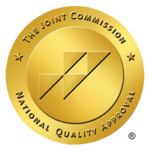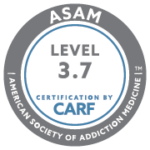When you bring up addiction, you probably should first know how to describe one. How do you describe addiction? In the medical journals, it is defined as chemical or habitual dependence, in which a stimulus is sought past the point of negative consequences. Addiction can come from a chemical that creates substance-dependence, but it can also occur naturally even with non-addicting triggers. This is how some people can become addicted to non-chemical things like exercise, cutting, or eating.
One of the most difficult things for family members to do is bring up an addiction, especially when speaking to that very loved one about their problem. The first step is to help your loved one see the very real impact and dangers of their current addiction. You may have several talks along the way. But how can you be compassionate, accurate, supportive, and deadly serious all at once?
We have a few helpful guide points that can shape this difficult conversation.
Talk About Behaviors, Not the Person
Gandhi once said “hate the sin, not the sinner” and this applies very profoundly when it comes to addiction. Addiction is not a reflection of someone’s love for the people around them, or for themselves. Addiction is a trap that creates certain distinctive behaviors. These behaviors can be identified like the symptoms of an illness. Becoming isolated and evasive, stealing money, and even saying hurtful things are all common symptoms of addiction.
Talk to your loved one about how their actions are becoming harmful to themselves and others, but don’t put the blame on them as a person. Addiction is a sign that someone needs help, as if they have fallen into a quicksand pit and cannot help but sink.
Talk About Addictive Personality Disorder
Sometimes addiction doesn’t make sense in the light of chemical dependence. A person with the right (or wrong) psychology or brain chemistry can become addicted to almost anything. There are those who become addicted to television, drinking too much water, or chewing the ends of their hair. There are those who become addicted to their romantic partner, or their children, and form addictive behaviors around maintaining their company.
When you bring up an addiction, talk to your loved one about the challenges of living with addictive personality behavior, and the possibility of this as the source of their troubles. Those who tend toward addiction need to build routines and defenses just like any other manageable psychological condition, and they often succeed.
Talk About the Body and Chemical Dependence
It’s also important to talk about chemical dependence and chemical habituation. If your loved one is addicted to a substance like alcohol, nicotine, pills, or powders, they will need to go through withdrawals and overcome the chemical dependence before any parallel psychological addiction can be tackled.
Chemical habituation is similar, but has less dangerous withdrawals. Habituation is when the body gets used to something non-addictive like marijuana or even just health-supplements (ex: melatonin, Iron, Vitamin Bs) or powerful produce like grapefruit. The body gets used to the slightly altered state created and feels “off” when the supplement or non-addicting chemical is removed.
Talk About Personal Health and Wellbeing
Often, those suffering from addiction miss the physical signs that they are becoming ill. You can sometimes affect a reality-check by setting your loved one in front of a mirror and talking about their physical health and wellbeing. Show if they are losing or gaining weight. Point out if their skin has changed color or is in poor shape, or if their hair is becoming dull or brittle.
Gently mention any changes in dress, hygiene, or keeping up with home cleanliness—but relate this to signs of internal wellbeing. Bring up an addiction in a way that highlights how you are concerned and want to help maintain their own personal standards of health and mental wellness.
Talk About Withdrawal Avoidance vs Psychological Addiction
Withdrawal avoidance is a very big topic when talking about facing an addiction with the one addicted. Just like you separate addiction behaviors from the person, separate withdrawal avoidance from what they really want. When chemical addicted substance fades, the patient can get sick as their body learns to live without the substance. So the patient takes extreme measures to avoid the withdrawal sickness.
Believe it or not, this also happens with psychological addiction too. Often, because the patient is using their addiction to avoid dealing with underlying issues. Trauma, for example, can cause a pattern of addictive personality disorder, or unresolved sources of stress and strife in a person’s life.
Talk about ways to ease the pain of either chemical or psychological withdrawals from the addictive trigger.
Talk About the Potential for Change and Building a Future
Finally, talk to your loved one about the future. When someone is in the throes of addictive self-destruction or struggling to overcome a powerful habit, they need a bright future to move toward. Don’t paint a pie-in-the-sky, just talk about realistic good things that can happen as you work toward beating the addiction.
Plan a road trip together, and talk about how your friend will be on-the-ball after recovery so they can drive or navigate. Talk about spending time with mutual loved-ones and the good times you’ll have. Talk about fun things you can do once they’re ready to face crowds again. Or talk about how they’ll get a new job and a new place to start over fresh.
Build a positive future, one your friend will be comforted by and reach for as they fight their inner demons.
—
If your loved one is ready to take the first steps, we can help. Those seeking rehab and addiction treatment in Fresno, California call 844-489-0836. We look forward to hearing from you and will begin your loved one’s consultation right away.








